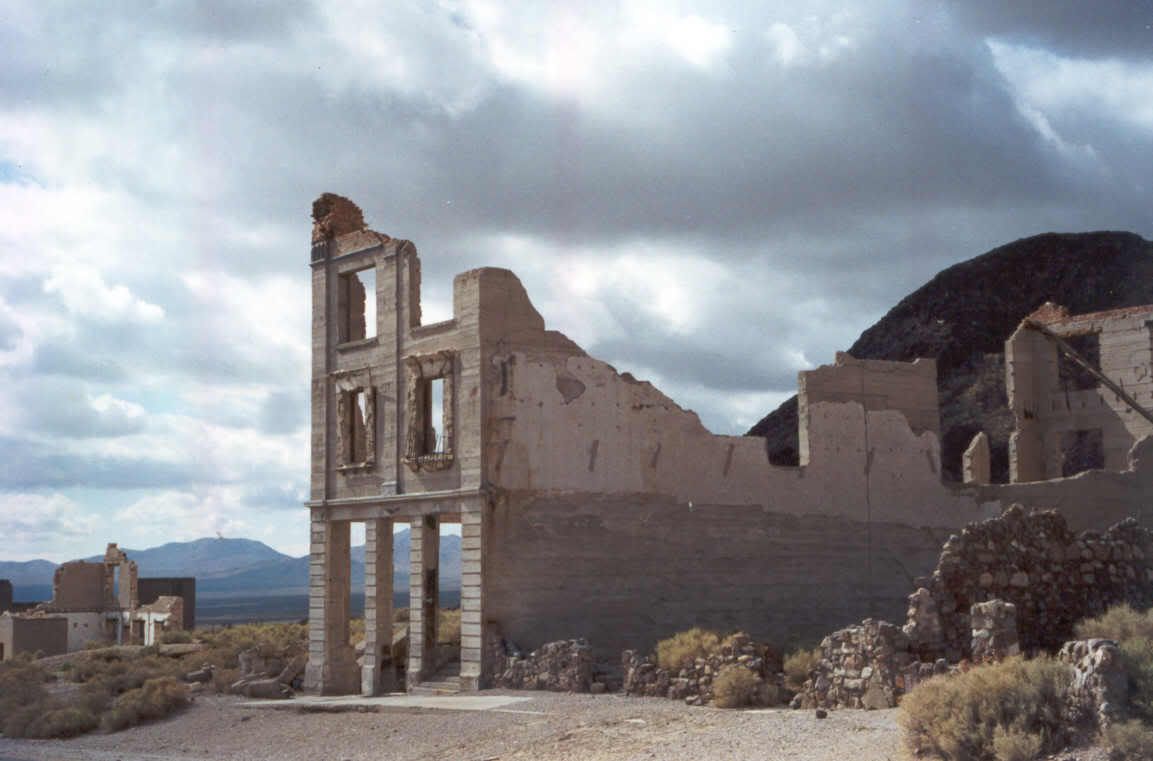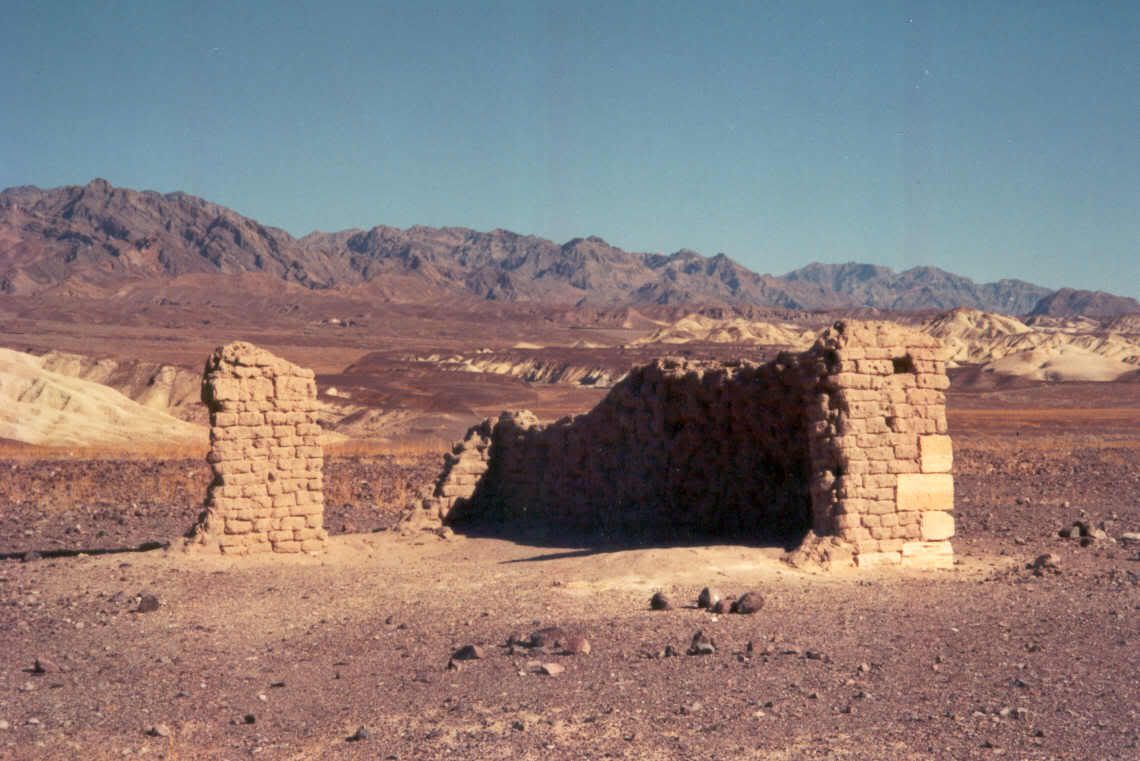Shorty Harris (revised)
Posted: October 24th, 2005, 11:59 pm
Frank "Shorty" Harris roamed Death Valley and the hills of southern Nevada for years, a single-blanket jackass prospector, living on borrowed time.... "rainbow chasers", they were called. He went forth with canteen and whiskey jug, mainly after a big-sky view, I suspect. But he had a nose for precious metal, in part because he knew rudimentary geology, but in greater part because he loved those hills. He loved to be out there. His first, and best, strike-- his great gold vein-- was tucked inside a plain ripple in the Bullfrog Hills, one of millions. It must have been raw instinct, or heightened accuity of the senses, which grows when noise is put on the shelf for a good long time.
He rode the rails west in the 1870s and spent decades perfecting his wanderlust in mining districts from Tombstone to Idaho, before landing in Nevada. It was Shorty who named the Bullfrog Hills. He had come up empty at Goldfield, and again at Keane's Wonder mine in the Funeral Mountains. But the desert was truly limitless to Shorty. He simply partnered with another chaser named Ernest Cross and set off toward unnamed dry hills east of Hell's Gate, which Shorty deemed promising. Eventually, he spied a peculiar green rock shaped like the back of a bullfrog. He turned it over and discovered the richest gold strike of his life, whereupon he and his partner headed for the nearest town to file their great claim, which Shorty named, "Bullfrog".
At least that's how Shorty told it. Cross later claimed that it was he, not Shorty, who first found gold. But no one disputes Shorty's gold-inflected sixth sense, which dialed in major pay dirt out of a feathery horizon; an intuition which launched the great and robust Bullfrog boom of 1904 and its thriving city of Rhyolite, which, at its peak, numbered 12,000 residents and featured a stock exchange, opera house, and hospital, as well as a three-story bank and a two-story school made of reinforced concrete. Concrete gravitates toward money. Add to this two churches, 31 saloons, and a red light district which drew prostitutes from as far away as San Francisco, and one gets the gist of it. It was a gold strike for the ages, a big money town built to last. Twelve years later, the mines played out, and the plug was pulled.
But for Shorty, the good life only got better. He simply moved on, a little further out. He knew the best trails. He reached an understanding with his limitless desert. Not long after his monumental Bullfrog strike, he threw a major party, and before the night was over, he had sold his rich claim for a mere $1,000. He slept off the festivities for a day or two, then promptly blew much of what he had left on several more bottles of 'O be Joyful' and some supplies. He would return to the big-sky slopes. He saw something out there.
Shorty and his burro trekked across Death Valley's realm for his remaining years, inside a timeless wander. Perhaps if one spends enough time in burnt depths of the earth's strata, it seeps in, latent treasure. He never lost his touch, his nose for valuable ore, though he was prone to spin tall tales on the subject, or any other. Shorty loved to talk, and truth wasn't his strong suit. But he took care of his people when he was paid, and they returned the favor. He filed his claims promptly, with no intent to ever work them. He preferred a saloon over the hard toil of mucking ore.
Where does the trail end and the legend begin? Shorty is said to have survived his first funeral. He was in Ballarat for the big Fourth of July celebration, three sheets to the wind and stretched thin after a two-day toot. When he finally passed out, his friends collected some planks, built a coffin, and gently laid Shorty to rest inside. When he began to stir, his friends gathered around and began their eulogies. Shorty listened, but held still. But when the boys lifted the coffin and started toward the graveyard, he yelled and jumped out of his box. He ran for his burro and rode straight out of town.
Shorty would often stop for a few swigs of 'O be Joyful' out on the trail to collect his sensibilities. As he studied the desert's unseen riches, he would look behind at times and see a penguin following him around. He would blink once or twice and chalk it up to an errant heatwave. Mostly, he remained a fan of dry heat and windswept earth. He didn't want to miss any of it. He thrived on borrowed time. He understood the music of basin and range and received it as high profit. He was onto something powerfully elementary, I suspect.

Ruins of Rhyolite, Nevada

Harmony Borax Works, Death Valley
.... out prospectin'....
He rode the rails west in the 1870s and spent decades perfecting his wanderlust in mining districts from Tombstone to Idaho, before landing in Nevada. It was Shorty who named the Bullfrog Hills. He had come up empty at Goldfield, and again at Keane's Wonder mine in the Funeral Mountains. But the desert was truly limitless to Shorty. He simply partnered with another chaser named Ernest Cross and set off toward unnamed dry hills east of Hell's Gate, which Shorty deemed promising. Eventually, he spied a peculiar green rock shaped like the back of a bullfrog. He turned it over and discovered the richest gold strike of his life, whereupon he and his partner headed for the nearest town to file their great claim, which Shorty named, "Bullfrog".
At least that's how Shorty told it. Cross later claimed that it was he, not Shorty, who first found gold. But no one disputes Shorty's gold-inflected sixth sense, which dialed in major pay dirt out of a feathery horizon; an intuition which launched the great and robust Bullfrog boom of 1904 and its thriving city of Rhyolite, which, at its peak, numbered 12,000 residents and featured a stock exchange, opera house, and hospital, as well as a three-story bank and a two-story school made of reinforced concrete. Concrete gravitates toward money. Add to this two churches, 31 saloons, and a red light district which drew prostitutes from as far away as San Francisco, and one gets the gist of it. It was a gold strike for the ages, a big money town built to last. Twelve years later, the mines played out, and the plug was pulled.
But for Shorty, the good life only got better. He simply moved on, a little further out. He knew the best trails. He reached an understanding with his limitless desert. Not long after his monumental Bullfrog strike, he threw a major party, and before the night was over, he had sold his rich claim for a mere $1,000. He slept off the festivities for a day or two, then promptly blew much of what he had left on several more bottles of 'O be Joyful' and some supplies. He would return to the big-sky slopes. He saw something out there.
Shorty and his burro trekked across Death Valley's realm for his remaining years, inside a timeless wander. Perhaps if one spends enough time in burnt depths of the earth's strata, it seeps in, latent treasure. He never lost his touch, his nose for valuable ore, though he was prone to spin tall tales on the subject, or any other. Shorty loved to talk, and truth wasn't his strong suit. But he took care of his people when he was paid, and they returned the favor. He filed his claims promptly, with no intent to ever work them. He preferred a saloon over the hard toil of mucking ore.
Where does the trail end and the legend begin? Shorty is said to have survived his first funeral. He was in Ballarat for the big Fourth of July celebration, three sheets to the wind and stretched thin after a two-day toot. When he finally passed out, his friends collected some planks, built a coffin, and gently laid Shorty to rest inside. When he began to stir, his friends gathered around and began their eulogies. Shorty listened, but held still. But when the boys lifted the coffin and started toward the graveyard, he yelled and jumped out of his box. He ran for his burro and rode straight out of town.
Shorty would often stop for a few swigs of 'O be Joyful' out on the trail to collect his sensibilities. As he studied the desert's unseen riches, he would look behind at times and see a penguin following him around. He would blink once or twice and chalk it up to an errant heatwave. Mostly, he remained a fan of dry heat and windswept earth. He didn't want to miss any of it. He thrived on borrowed time. He understood the music of basin and range and received it as high profit. He was onto something powerfully elementary, I suspect.

Ruins of Rhyolite, Nevada

Harmony Borax Works, Death Valley
.... out prospectin'....